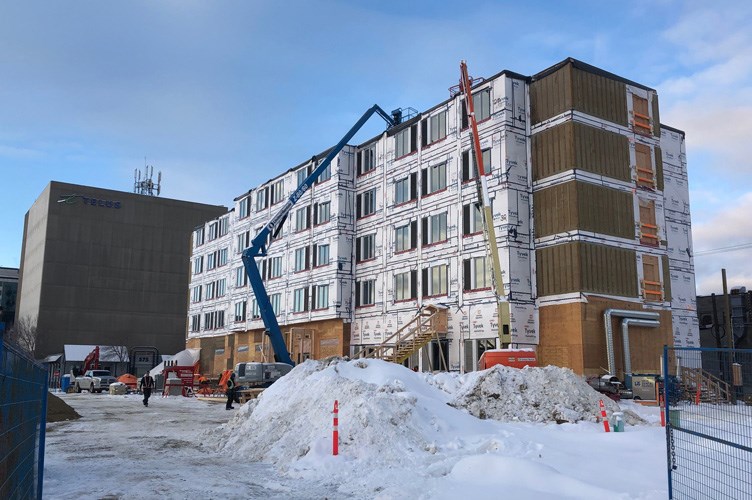The hospitality sector in Prince George was "on a roll" prior to the start of the COVID-19 pandemic just over a year ago, according to Tourism Prince George chairperson Elke Hierl-Steinbauer.
Between 2015 and 2021, the city saw the inventory of hotel rooms grow from approximately 1,900 to roughly 2,200 – a nearly 16 per cent increase in hotel capacity, she said in an email. Hierl-Steinbauer, who also serves as secretary-treasurer for the Prince George Accommodations Association and has managed hotels in the city for more than 20 years, said a strategy to expand hotel capacity developed ahead of the 2015 Canada Winter Games has paid off for the city.
"In the process to prepare for the Winter Games in 2015, which started a few years before the actual games happened, it became obvious that yes, we had enough hotel rooms to host, but did we have enough rooms of a quality that a person coming to Prince George for such a major event would expect? The answer at the time was no," she said. "As a result of this experience and as a strategy to make Prince George more attractive for city-wide events / get people to possibly extend their stay, the plan was/is to have more hotels of a quality that would enable the city to bid on bigger events. On a regional, provincial, Canada-wide, and on an international level."
Tourism Prince George, the City of Prince George, Downtown Business Improvement Association and Chamber of Commerce worked together to develop the hosting strategy, which has since paid dividends by attracting a number of high-profile events to the city.
Prince George is increasingly able to compete with other cities like Kelowna, Kamloops, Langley, Nanaimo and even Vancouver as a location to host events, she said.
"(Last year) was originally expected to be a fantastic year with... the city hosting the Women’s World Curling Championships, several other big sports events on the books, as well as a number of city-wide conferences, tour groups, the Route 16 project being very successful, weddings, meetings, conferences," Hierl-Steinbauer said. "The year looked great! And then pouf, here comes COVID. Yes it hurt. And it still hurts now."
The hospitality industry has been one of the hardest-hit by the pandemic, which directly impacts jobs in the city, she said.
Prior to 2020, hotels employed roughly 1,500 people in the city, with the broader hospitality sector employing roughly 2,700 others, Hierl-Steinbauer said.
"COVID changed the world, and we (city and the hospitality industry) will have to re-think and re-strategize and see how things can be tackled in the future," she said.
City manager of economic development Melissa Barcellos said the city's strategic location and economic fundamentals have driven the growth in the accommodation sector.
An estimated $227 billion in major capital projects – both public and private – are underway or planned in northern and central B.C., Barcellos said in an email.
"Prince George is the supply centre for a region of 318,708 people. Many people from small surrounding communities visit P.G. on weekends for entertainment, shopping, etc. and often stay overnight," she said. "Prince George (is) the largest city in the region and attracts a significant amount of business, government and healthcare travel. Health professionals/specialists travel to the city regularly, which requires them to stay in hotels or Northern Health housing."
Prior to the pandemic, the Prince George Conference and Civic Centre hosted an average of 500 events per year with more than 150,000 individual attendees.
Between June 2016 and June 2017, events at the civic centre drew 8,246 non-local delegates, Barcellos said. On average, each non-local delegate spent $673 in the community, contributing to $4.7 million in economic activity and supporting 84 direct and indirect jobs, she added.
In addition, roughly a quarter-million people attend events at CN Centre annually, prior to the pandemic, she said.
In her budget presentation to city council in January, Tourism Prince George CEO Tracey McBride said her organization was projecting a 45 per cent reduction in revenue from the Municipal and Regional District Tax (MRDT) which the city collects and provides to the organization, compared to 2019 levels.
"Currently average revenues from hotels are tracking at 39 (per cent of 2019 revenues) as of early August, 2020," McBride wrote in her report. "All indications for 2020 was another increased revenue year maintaining a ten-year tourism growth streak in British Columbia. When the pandemic hit, the 2020 budget had to be realigned to reflect the decrease in revenues and was adjusted to 35 (per cent) of 2019’s actuals."
In an email to The Citizen, McBride said Tourism Prince George is working on a strategy to help the city's hotel and tourism sector recover in a post-pandemic world.
"As for where things are heading for post-COVID in terms of hotel growth is uncertain at this point," McBride said. "We are currently conducting a report on recommendations on all those sectors based on current research, stakeholder input, and expertise from a consultant we have hired to be completed this summer. We will be looking at recommendations for a strategy that would speak to opportunities and goals for the future. We will share that with our stakeholders when complete in June."



